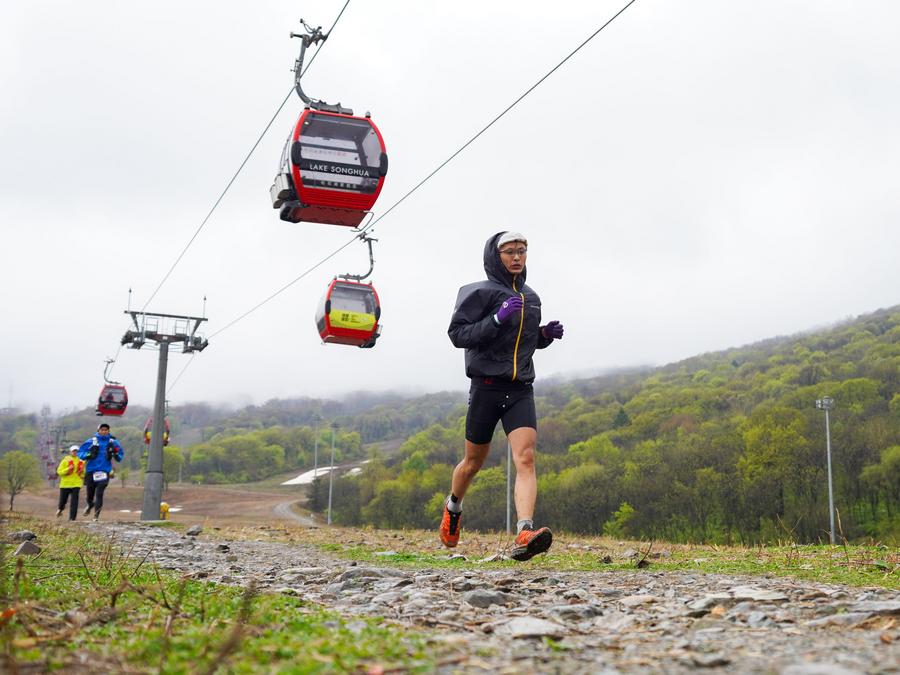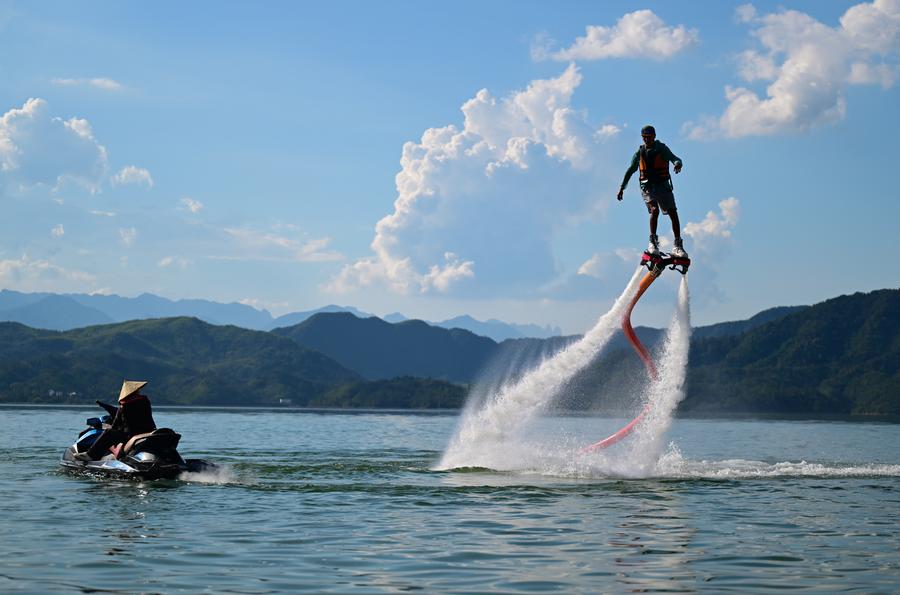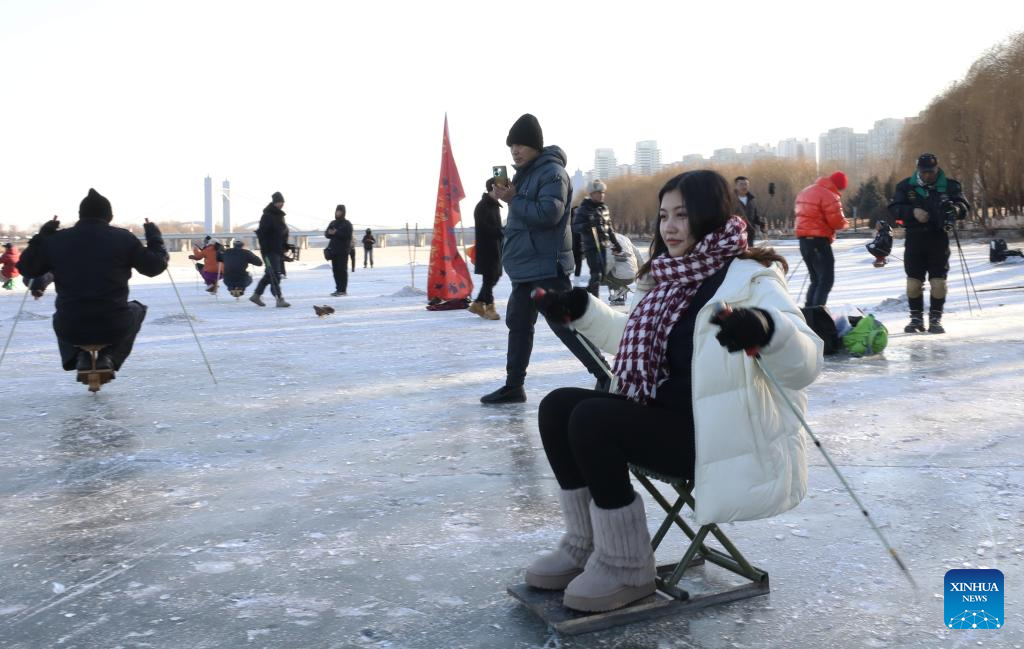
Chinese enthusiasts' newfound passion for outdoor sports and related leisure activities is providing fresh momentum to, and fueling, sports industry growth, turning urban waterways, ski resorts and mountain campsites into hot destinations.
An Olympic champion and a busy sports administrator, retired skating legend Yang Yang takes pride in the role she enjoys the most — being an active mom with her son and daughter, either taking them to cycle along the Huangpu River near their home in Shanghai, or enjoying laughs as they slide around on their butts, or bellies, at the ice rink she operates.
Leaning on the pure joy and relaxation of sporting activities, especially outdoor pastimes, as a healthy way of life is among the most important lessons she's taught her children as a caring mom and, perhaps, China's most decorated winter sports athlete ever.
"I think, just like the case with my children, to spend time on outdoor activities, either hiking, biking or camping, has been a trending choice for family holidays and an educational tool for the youth," said Yang, who won China's first-ever Winter Olympic gold medal in 500m short-track speed skating at the 2002 Salt Lake City Games in Utah.
"With more accessible and affordable facilities being built, I think the outdoor sports sector will explode, for sure, in the next few years," Yang said during the 2025 China Outdoor Sports Industry Conference held in Dali, Yunnan province, over the weekend.
Official stats have backed up Yang's sentiment.
According to an industry report released at the conference by the sports economy department of the General Administration of Sport of China, as of the beginning of April, outdoor sports activities had engaged over 400 million Chinese people, meaning one in every three people participates in such exercises regularly.

Chinese business operators remain bullish on the sector's continued growth potential, with about 24,000 new enterprises registered as outdoor sports products and service providers in the first half of 2025, according to the report, taking the total number of such companies to 335,000 by the end of June.
The numbers might sound dull, but the bustling scenes of young people suiting up at ski resorts in Zhangjiakou, Beijing 2022's co-host in Hebei province, to enjoy a downhill adrenaline rush on the slopes this week offered seemingly incontrovertible testimony to their veracity.
ALSO READ: China aims to boost sports consumption
Or just go back a few months to see how tough it was to find a spot on the banks of downtown Beijing's Liangma River, where locals and expats turned the city waterway into a hot spot for paddleboarding, kayaking and other water sports, seeking relief from the capital's scorching summer heat.
"Outdoor sports have become a key drive for stimulating consumption in the sports and tourism sectors, and have been embraced by more Chinese people as a lifestyle and a platform for socializing," explained Yang Xuedong, director of the GASC's sports economy department, during the opening ceremony of the conference in Dali.
This year's outdoor sports conference, its third edition since being launched in the Dali Bai autonomous prefecture in 2023, featured four major sections — themed forums, shows and performances, resource promotions and competitions, which included a cycling race around Erhai Lake in Dali, a sailing regatta and a hiking competition.
Including the host prefecture, 49 such lakeside resorts, mountain parks and natural campsites were announced at the conference as the first batch of China's national high-quality outdoor sports destinations.

Owners and operators of the listed destinations will receive funding support and preferential policies from relevant government departments for facility upgrades, infrastructure renovation, emergency rescue deployment and, most importantly, preservation and protection of natural resources, according to a guideline issued in July by the GASC and the National Development and Reform Commission, China's economic planning body.
Facilitated by such strong backing, the outdoor sports sector's market value is expected to continue growing at a faster pace than indoor sports businesses, estimated Yang, and will significantly contribute to the national target of propelling the total scale of a full-fledged sports industry to 7 trillion yuan ($986 billion) by 2030.
Experts believe the move will lower barriers to participation and, in turn, attract more people to outdoor fitness.
Guo Jianjun, a professor of sports and medicine integrative innovation at Capital University of Physical Education and Sports, said the development of high-quality outdoor destinations, by making natural attractions more accessible to urban enthusiasts, will help bring more customers and revenue.
"High-standard facilities and beautiful environments, backed up by more convenient and more affordable access, will lower the barriers to participation, thereby attracting more people to engage in outdoor sports," Guo said.
Tourism, hospitality, sales of merchandise and youth training are among areas where consumption potential could be further tapped with the continued development of outdoor sports destinations, said Yang.

According to the industry report, 26 national ski resorts had recorded 37.65 million visits during the 2024-25 winter season, achieving total revenue of 24.3 billion yuan from ticketing, catering, accommodation and training.
With yet another Winter Olympics just around the corner, ski resort operators across the country have been busy expanding their businesses and improving services.
READ MORE: China's winter sports industry rides Olympic wave
"The Olympic season is always a strong season, no doubt about it," said Jia Dong, a deputy general manager at the Fulong Ski Resort in Chongli district of Zhangjiakou.
"We've renovated and expanded our snow park to make it 30 percent bigger than last year with a total area of 300,000 square meters. We are expecting peak season very soon."



